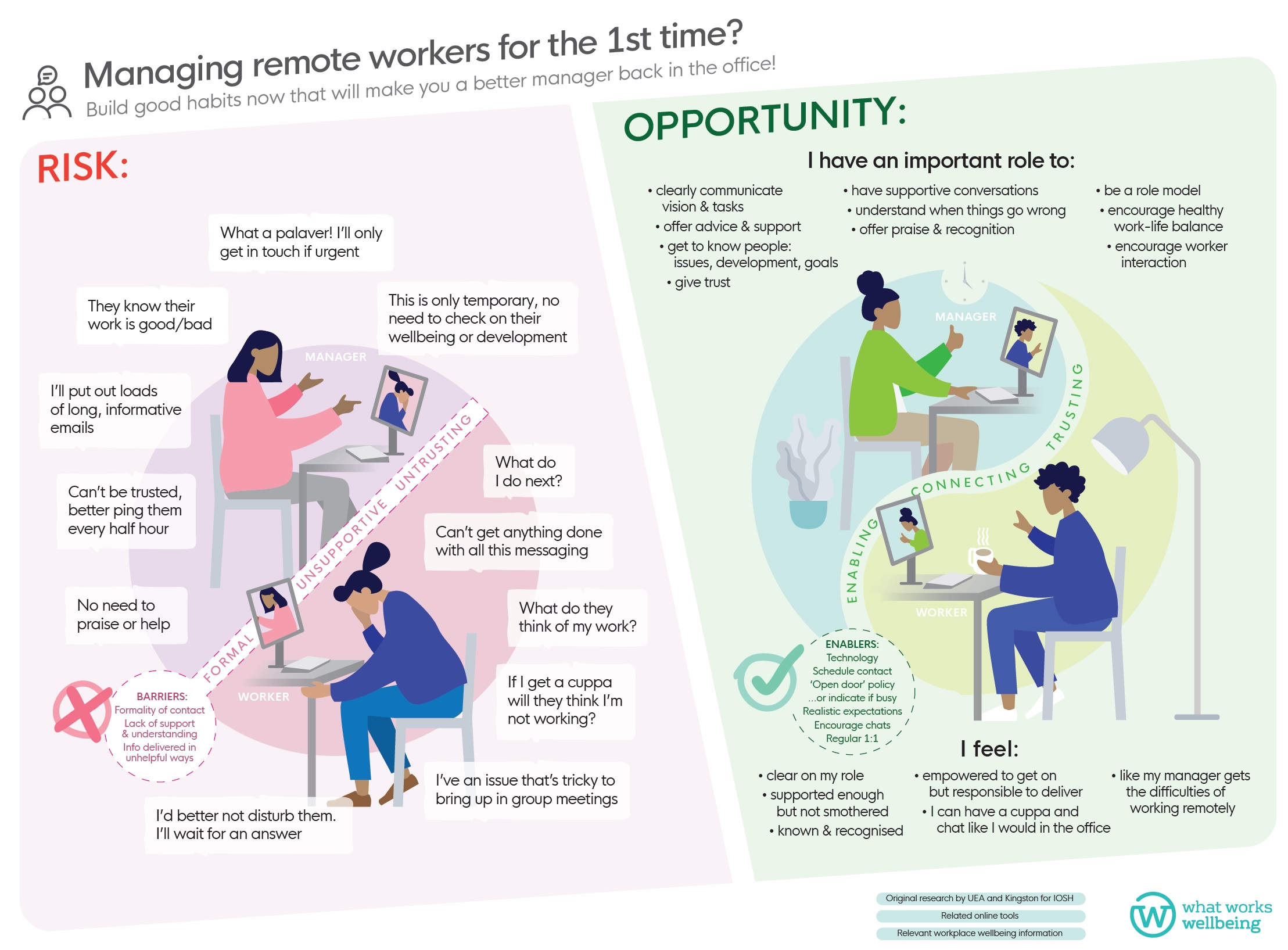For those remaining in work, record numbers of working age adults are likely to be working from home for the first time, in response to Government advice to delay the spread of Covid-19.
Advice is already circulating for individual workers on how to keep sane and safe, including this from the Society for Occupational Medicine. Yet, this important advice leaves a gap about the role of managers.
Line managers and the professionals who support them – human resource and occupational health practitioners – play an important role in keeping employees connected, motivated and satisfied. From research carried out by the University of East Anglia for the Centre, we know that good line managers are one of the five key ways of promoting workplace wellbeing.
Setting up the tech, then thinking beyond it
Ensuring video conferencing technology is up and running will be an early priority. Then, soon good managers will realise that they need to focus on more than technology to keep work flowing. Good management is about people, relationships and communication. Workers need support, recognition and feedback, as well as to feel their manager understands the challenges of their current working situation and manages accordingly.
Different communication methods
Learning to manage remotely can make you a better manager. This is precisely because moving to a different communication method makes managers sit down and think about what they need to achieve and how to achieve it.
This contrasts with working on intuition and luck in an ordinary office setting. Managers will need a clear understanding of the challenges and opportunities of remote working, to make the most of the situation.
Research carried out for the Institution of Occupational Safety and Health (IOSH) highlighted key barriers experienced when managing distributed workers – especially in relation to looking after their wellbeing and safety. Less informal face-to-face time makes it harder for managers to get to know people’s issues and aspirations, understand the way they work, offer immediate advice and role model good behaviours.
In addition, workers suffer if they cannot ask questions informally or rely on social support from people working with them. In remote conditions, HR and OSH professionals do not find it as easy to let managers and workers know what is expected of them or know if their messages are getting through.
Research shows how to build management skills
Ever had a bad boss? Then you will know exactly how much sway a manager has over how you feel about your work. Yet there are a lot of ‘accidental managers’ – people promoted for their technical or operational skill who have never been taught what makes a good manager.
Luckily, the research gives us a good idea of how to turn the risks of managing remote workers into an opportunity to build management skills for the future. If individual managers start to think more about the wide range of different reasons they interact with workers (task setting and assistance, wellbeing and safety support, feedback and personal development, social interaction to build good working relationships) they can schedule in technology-enabled contact time to address each aspect.
Getting the balance right between contact, support and worker responsibility may take a while – but although active scheduling makes this more visible, the considerations are no different from how they should be in less exceptional times.
The visualisation below highlights some of the ways to overcome potential barriers and enable good remote working (it’s easier to view if you download it as a full-size PDF). While much can be done on a one to one level between managers and workers, human resource (HR) and occupational safety and health (OSH) professionals can also play an important role in preparing policies, procedures and information sheets on wellbeing and safety.

Download this visualisation as a PDF
These types of resources help the group of managers and workers as a whole, by ensuring management practices for remote workers are consistent and transparent. Knowing who to ask for help and how to reach them is important, especially when things go wrong and you are far from the office. HR and OSH practitioners can make people aware that they are supported and that options are available.
While social media is awash with campaigns for mutual support and community spirit in a time of crisis, the role people can play during their working lives may be overlooked. This is a mistake. Not only can you make a difference to lives by learning to be a better remote manager now, the skills you learn could build a better work environment for all the future.
If you would like to use the interactive self-assessment tools on leadership style and practitioner support, visit the IOSH website. It can help you understand your current strengths and areas that you might want to improve.
